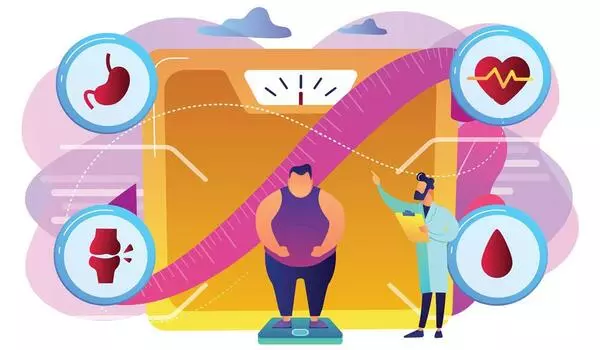Obesity is a major health problem worldwide, and many people struggle with weight loss. While surgical procedures such as bariatric surgery can be effective for some individuals, they are not appropriate or desired by everyone. Fortunately, there are other options available for those who want to lose weight without surgery or the side effects of medication.
Imagine receiving the benefits of gastric bypass surgery without having to go under the knife; a new class of compounds may be able to do just that. These potential treatments significantly reduce weight and blood glucose levels in laboratory animals. The injectable compounds also avoid the nausea and vomiting that are common side effects of current weight-loss and diabetes medications. Scientists now report that the new treatment not only decreases eating but also increases calorie burn.
The researchers will present their findings today at the American Chemical Society (ACS) spring meeting.
“Obesity and diabetes were the pandemic before the COVID-19 pandemic,” says Robert Doyle, Ph.D., one of the two principal investigators on the project, along with Christian Roth, M.D. “They are a massive problem, and they are projected to only get worse.”
Obesity and diabetes were the pandemic before the COVID-19 pandemic. They are a massive problem, and they are projected to only get worse.
Robert Doyle
Gastric bypass and related procedures, known collectively as bariatric surgery, provide one solution, frequently resulting in long-term weight loss and even diabetes remission. However, these operations are risky, aren’t appropriate for everyone, and aren’t available to many of the world’s hundreds of millions of obese or diabetic people. As an alternative, Doyle suggests that they address their metabolic issues with a drug that mimics the long-term benefits of surgery.
These advantages are linked to a change in the gut’s secretion levels of certain hormones, such as glucagon-like peptide-1 (GLP-1) and peptide YY (PYY), which signal fullness, curb appetite, and normalize blood sugar after bypass surgery. Current drugs aimed at replicating this effect primarily activate GLP-1 cellular receptors in the pancreas and brain. This method has shown great success in reducing weight and treating type 2 diabetes, prompting many celebrities to post about it on social media in recent months. However, many people, according to Doyle, are unable to tolerate the drugs’ side effects. “Within a year, 80 to 90% of people who start taking these drugs are no longer taking them.” Doyle is affiliated with Syracuse University and SUNY Upstate Medical University, while Roth is affiliated with Seattle Children’s Research Institute.

Obesity treatment could offer dramatic weight loss without surgery or nausea
To address that drawback, various researchers have designed other treatments that interact with more than one type of gut hormone receptor. For example, Doyle’s group created a peptide that activates two receptors for PYY, as well as the receptor for GLP-1. Dubbed GEP44, this compound caused obese rats to eat up to 80% less than they would typically eat. By the end of one 16-day study, they lost an average of 12% of their weight.
That was more than three times the amount lost by rats treated with liraglutide, an injected drug that activates only the GLP-1 receptor and that is approved by the U.S. Food and Drug Administration for treating obesity. In contrast to liraglutide, tests with GEP44 in rats and shrews (a mammal that, unlike rats, is capable of vomiting) revealed no sign of nausea or vomiting, possibly because activating multiple receptors may cancel out the intracellular signaling pathway that drives those symptoms, Doyle says.
His team’s most recent findings show that the weight loss caused by GEP44 can be attributed not only to less eating, but also to increased energy expenditure, which can manifest as increased movement, heart rate, or body temperature.
GEP44 has a half-life of about an hour in the body, but Doyle’s group has recently designed a peptide with a much longer half-life. That is, instead of multiple injections per day, it could be given once or twice a week. According to Doyle, the researchers are now reporting that rats treated with this next-generation compound maintain their new, slimmer physique even after treatment ends, which is not always the case with currently approved drugs.
However, weight loss isn’t the only advantage of peptide treatments. They also lower blood sugar by pulling glucose into muscle tissue, where it can be used as fuel, and by converting certain pancreatic cells into insulin-producing cells, assisting in the replacement of those damaged by diabetes. There’s one more advantage: Doyle and Heath Schmidt, Ph.D., of the University of Pennsylvania, recently reported that GEP44 reduces fentanyl craving in rats. If it works in humans, Doyle believes it could help addicts quit using drugs or prevent a relapse.
The researchers have filed for patents on their compounds, and they plan to test their peptides in primates. They will also study how the treatments change gene expression and rewire the brain, and what that could mean for these compounds, as well as other types of medication.
“We didn’t think you could separate weight loss from nausea and vomiting for a long time because they’re linked to the same part of the brain,” Doyle says. However, the researchers have now uncoupled those two pathways, which has implications for chemotherapy, which has similar side effects. “What if we could keep the benefit of chemotherapy drugs while telling the part of the brain that causes vomiting and nausea to shut up?” Then we could dose patients at a higher level, giving them a better prognosis and a better quality of life while undergoing chemotherapy,” he says.





